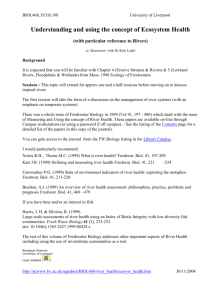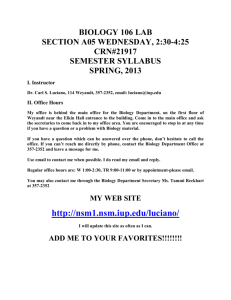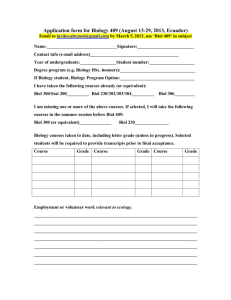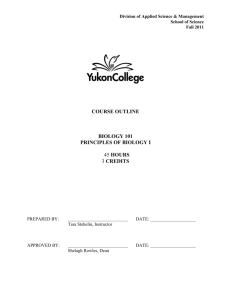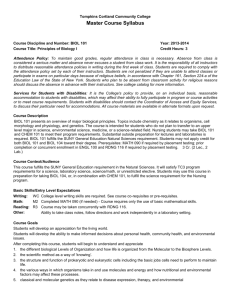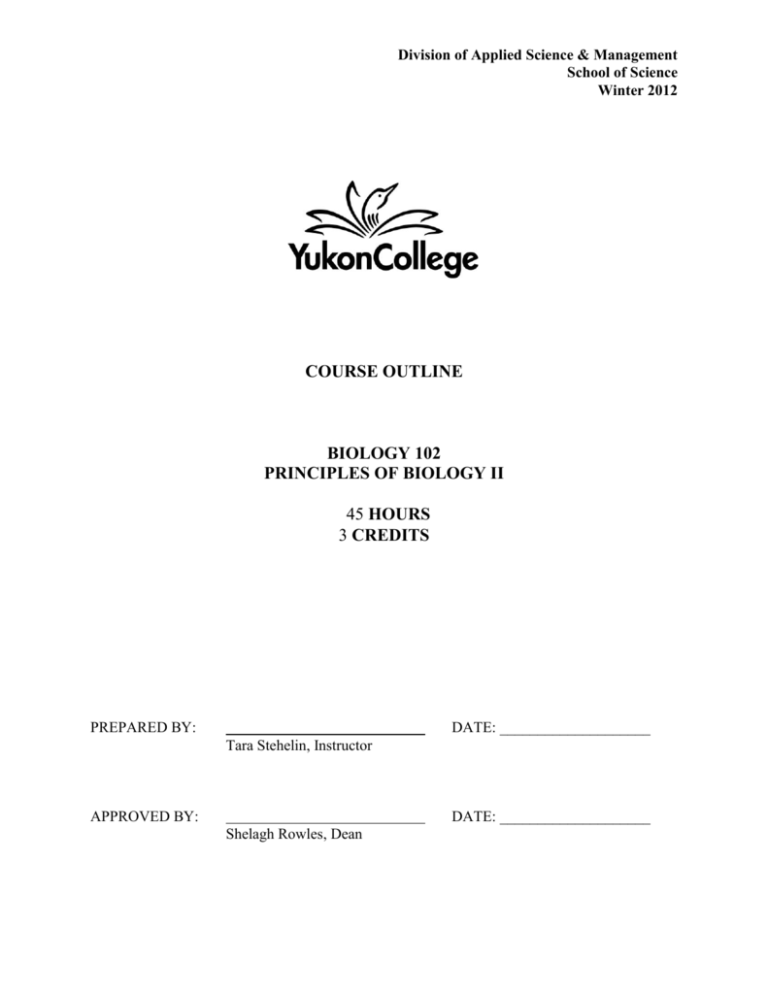
Division of Applied Science & Management
School of Science
Winter 2012
COURSE OUTLINE
BIOLOGY 102
PRINCIPLES OF BIOLOGY II
45 HOURS
3 CREDITS
PREPARED BY:
DATE: ____________________
Tara Stehelin, Instructor
APPROVED BY:
DATE: ____________________
Shelagh Rowles, Dean
YUKON COLLEGE
Copyright September, 2011
All rights reserved. No part of this material covered by this copyright may be reproduced or
utilized in any form or by any means, electronic or mechanical, traded, or rented or resold,
without written permission from Yukon College.
Course Outline prepared by Tara Stehelin, December 14, 2011.
Yukon College
P.O. Box 2799
Whitehorse, YT
Y1A 5K4
DIVISION OF APPLIED SCIENCE AND MANAGEMENT
Biology 102
Credit Course
Winter 2012
BIOLOGY 102, PRINCIPLES OF BIOLOGY II
INSTRUCTOR: Tara Stehelin, B. Sc., M. Sc.
OFFICE HOURS: FRIDAY 11:00 – 12:30, or by appointment
OFFICE LOCATION: A2806 (behind biology lab)
TELEPHONE: 668-8898
E-MAIL: tstehelin@yukoncollege.yk.ca
FAX:
COURSE OFFERING
DAYS & TIMES:
LECTURES Tuesdays and Thursdays 1:00 – 2:30
Room: A2103
LABS: Wednesdays OR Fridays 1:00 – 4:00
Room: A2805 (Biology Lab)
COURSE DESCRIPTION
A continuing introductory course following Bio 101, emphasizing principles of wide application
to all living organisms, including the mechanism of inheritance, basic anatomy, functioning of
the major systems in living organisms and behavior.
This course is part of core introductory science courses, transferrable to most Canadian
universities as a first-year level Biology course. A comparative approach to the unity and
diversity of organisms is stressed. Mandatory lab sessions reinforce subject matter presented in
lectures.
LEARNING OUTCOMES:
Upon successful completion of the course, students will be able to demonstrate understanding of
mechanisms by which genetic traits are inherited, and an understanding of organ functioning and
organs systems. Students will also be able to demonstrate knowledge of reproduction, cell
division, immunity, hormonal control systems, and mechanisms of homeostasis in both plants
and animals. Upon completion of mandatory lab sessions students will be able to demonstrate
patterns of inheritance, complete basic statistical tests on data, and demonstrate knowledge of the
following: vertebrate anatomy, principles of immunity, human health, animal behavior, and basic
research protocol.
COURSE TRANSFER:
Examples:
UBC With BIOL 101, first-year Biol 111/112/140. (6 credits)
UVIC With BIOL 101, Biol 190A and 190B 210 + 220 (3)
UAF(University of Alaska Fairbanks)
Biol 106x (3)
UAS With BIOL 101, Biol 113 (3)
UNBC Biol 100 (3) Yukon Biol 101 & 102 = UNBC Biol 100 (4) & Biol (2) 100L
UR
With BIOL 101, Biol 100/101 (6)
TRU-OL (Thompson Rivers University, formerly BC Open University) Biol 1210
TWU With BIOL 101, Biol 113/114
SFU BiSc 102 (3)
UBCO(University of British Columbia Okanagan) With BIOL101, Biol 116/125
UFV (University of the Fraser Valley, formerly University College of the Fraser Valley)
With BIOL 101, Biol 111/112
VIU (Vancouver Island University) With BIOL101, Biol 121/122
For more information about transferability contact the Arts and Science Division.
COURSE PREREQUISITES
Admission to the Arts and Science Division and Completion of Bio 101 or permission of
instructor.
DELIVERY METHODS/FORMAT:
Material will be presented in two lectures and one lab session per week. Attendance in the
laboratory is mandatory. Students must pass the lab and lecture portions independently.
COURSE REQUIREMENTS/EVALUATION:
Attendance and Participation
ATTENDANCE POLICY
Attendance is mandatory in labs and greatly encouraged in lectures. A student may be withdrawn
from a course if more than 10% of the scheduled contact hours are missed in any one course.
Withdrawal from a course may result in loss of full-time status and loss of sponsorship funding.
Absence from labs results in a zero grade assigned for assignments and quizzes relevant to the
missed lab. If the instructor is notified in advance of potential problems with attendance,
alternate work will be assigned.
Students must attend the laboratory session assigned to them upon registration, once per week.
Assignments
LAB ASSIGNMENTS
Assignments are given during laboratory sessions and graded on the basis of understanding and
applying principles involved as well as the correctness of answers to solutions. Most students
finish assignments during the lab session, although they are not due until the next week day. A
lab quiz will be given each week during each scheduled lab to assess progress. Written reports
may also be assigned.
Projects
None.
Tests
LECTURE
Quizzes on lecture material are given once every two weeks. There are 5 quizzes in total, worth 10%
each and then a final exam worth 15% of the total mark. The final examination will be held at the end
of the term. It will cover the entire course and the examination date will be announced as soon as
confirmed by administration.
LAB
Quizzes on laboratory material are given every lab session (except the first lab) and cover material
from the lab exercises the week before. There is no final lab exam.
Evaluation
On lecture material: five quizzes worth 10% each (50%), and a final exam worth 15% for a total
of 65% of the mark for the lecture portion of the course. Laboratory marks make up 35% of the
total mark. Laboratory assignments worth 15.75%, laboratory quizzes worth 15.75%, and
attendance and attitude in the lab worth 3.5% of total mark. There is no final exam for the
laboratory portion of the course.
Plagiarism
Plagiarism involves representing the words of someone else as your own, without citing the
source from which the material is taken. If the words of others are directly quoted or paraphrased,
they must be documented according to standard procedures (APA). The resubmission of a paper
for which you have previously received credit is considered a form of plagiarism.
Plagiarism is academic dishonesty, a serious academic offence, and will result in you receiving a
mark of zero (F) on the assignment or the course. In certain cases, it can also result in dismissal
from the college. And do not underestimate the impact such a situation will have on your
reputation.
STUDENTS WITH DISABILITIES OR CHRONIC CONDITIONS:
Reasonable accommodations are available for students with a documented disability or
chronic condition. It is the student’s responsibility to seek these accommodations. If a
student has a disability or chronic condition and may need accommodation to fully
participate in this class, he/she should contact the Learning Assistance Centre (LAC) at
(867) 668-8785 or lassist@yukoncollege.yk.ca.
REQUIRED TEXTBOOKS/MATERIALS:
“Biology, Concepts and Connections”, Campbell, Mitchell & Reece. 2012 7th Ed., Addison Wesley
Longman Press
Or
“Campbell Biology” 7th, 8th, or 9th Edition, Reece, Urry, Cain, Wasserman, Minorsky, and Jackson.
Pearson Benjamin Cummings
Lab Manual: assembled by instructor and handed out during first lab session
TOPIC OUTLINE/SYLLABUS
WEEK
TOPIC
1, 2, 3,
Biological reproduction
. cell division, genetic inheritance, gene functioning
_____________________________________________________________________________
4,5,6,7,8,
Biological systems, homeostatic processes
. Introduction to plant nutrition, animal nutrition
. Gas exchange and transport in plants and animals
. Immune systems of plants and animals
. Homeostasis of body fluids
9,10,11
Comparative control mechanisms
. Introduction to hormones: plants/animals
. Neurons, sensory receptors
. Brain functions, muscle function
. Behavior




